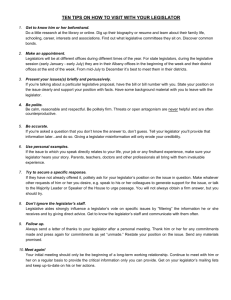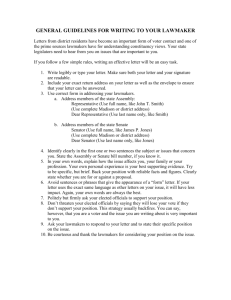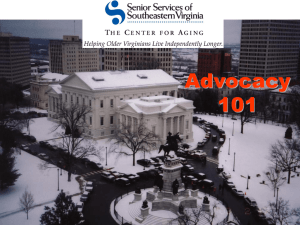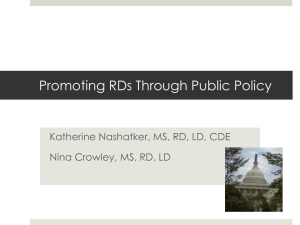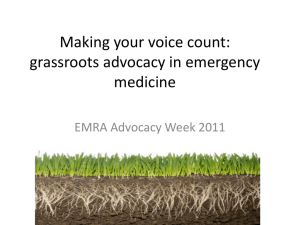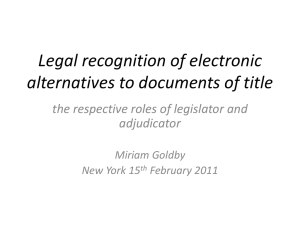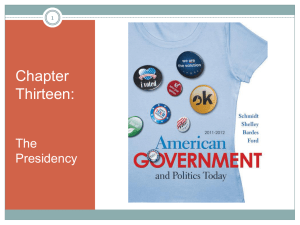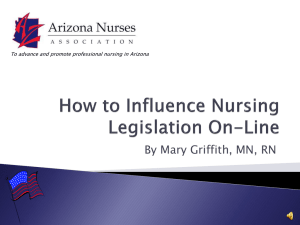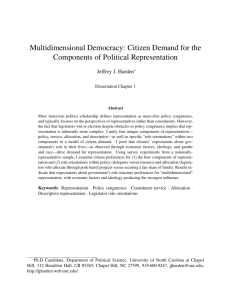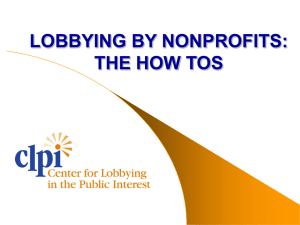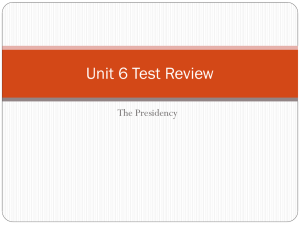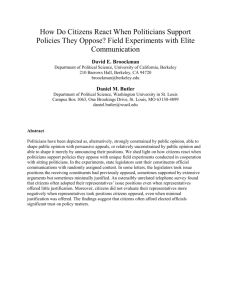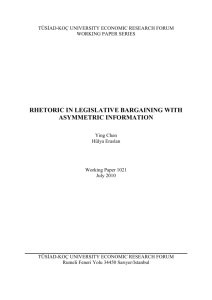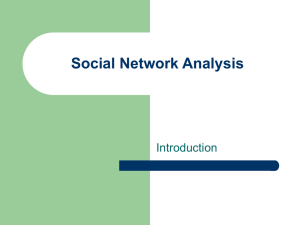Communicating with Legislators (download as powerpoint)
advertisement
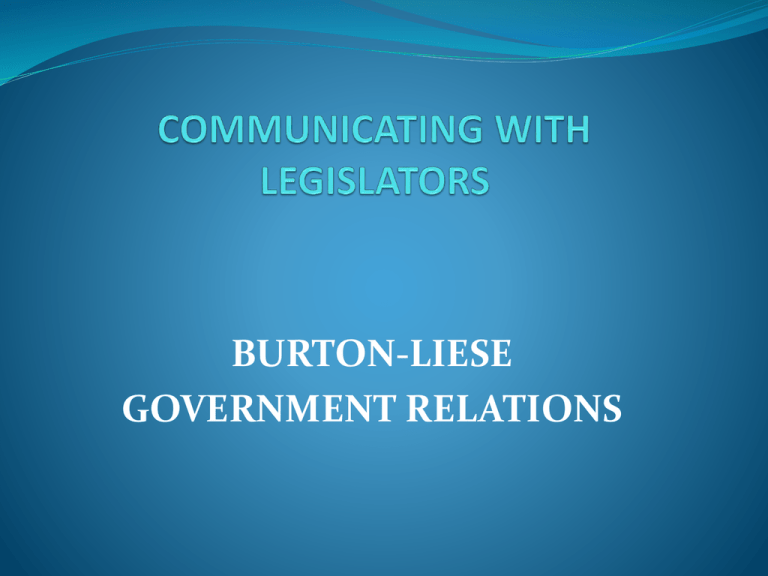
BURTON-LIESE GOVERNMENT RELATIONS BUILDING A FRIENDSHIP KNOW YOUR LEGISLATOR POLITICALLY: When the Legislator was first elected Other offices they held Their occupation What committees they are members of What is their relationship with your issues Political ambitions Their main supporters Political allies BUILDING A FRIENDSHIP (CON’T) KNOW YOUR LEGISLATOR PERSONALLY WHERE APPROPRIATE: Family/Friends Church Community Hobbies Education/Occupation NOTE: It is important to develop a friendship with your legislator. One of the easiest ways to limit your effectiveness is to become too issue orientated. Don’t communicate only when you “want something” or to discuss your issue. Build a personal relationship and talk about things of mutual interest or other issues that the legislator has. But most of all build your friendship on TRUST and CONFIDENCE Guidelines for communication Be prepared: Do your homework and know exactly what you are going to discuss and what points you want to cover Establish a common ground: Begin by reinforcing a mutual interest or issue. Thank him/her for a past vote that helped your area; or refer to a common interest; acquaintance or activity in your area. Take advantage of any commonality that reinforces agreement. Be Sincere!!!! Be Concise, specific and clear: Stick to the issue at hand and give necessary details. Provide complete information on specific actions or issues Be Reasonable: Do not over state your case. Factual, informative opinions far outweigh emotional appeals. Ultimatums or arguments are never effective. Do not make commitments involving donations. Personal commitments or assurances that you will consider his/her comments, are appropriate Guidelines for communication (con’t) Localize the issue: When legislators are in Jeff City they can, on occasion, loose sight of how a bill affects their district. You can help explain how a bill will affect you and other voting members in their district Don’t change your opinion: When you discuss legislation with a legislator who does not share your views, they will attempt to persuade you to change your opinion. Be careful and maintain your position. If you are confused, you may need to obtain clarification or information on a bill and get back with them Provide written material (if available): Evidence of support or success strengthens any issue- provide solutions if available. Say “Thank You”: Even if it is only for their time Follow-up: Write a thank you letter, restating your position and thank them for any support they offer Tell a colleague: When you are finished with your discussion, ask a colleague, who shares your opinion, to contact the legislator. It shows support back home. CALLING YOUR LEGISLATOR Know when to call: Legislators have busy schedules- committee hearings, floor debate, campaign events and meetings all seem to occur at the same time you want to contact them-they do!! During session, legislators are in Jeff City from Monday afternoon until Thur. afternoon. The best times to call are between 8am-10, noon to 2, 5-7pm. These times coincide with breaks in session and are good opportunities to catch them. Their offices are staffed Monday to Thursday 8:30 – 5pm Ask to speak to your legislator, personally: Legislators are elected to represent you. When you call, ask to speak with them personally. If your legislator is not available, leave a message letting them know you are calling about and ask them to return your call. Know what to say: Before you call, make sure you are comfortable with your knowledge of the bill/issue. It is important that you are able to deliver your message and substantiate it with facts. Not opinions!! Explain your organizations position on a particular bill in detail. Your legislator will probably ask questions, so be prepared. Understanding the oppositions positions is helpful in order to discuss their shortcomings CALLING YOUR LEGISLATOR (CON’T) BE CONSIDERATE OF THEIR TIME: If they must excuse themselves during your conversation, ask when you can call back ASK THEM TO KEEP YOU INFORMED: When you finish your call, ask them to keep you informed on the progress of the legislation you discussed. Tell them you are interested in how the committees/floor voted, and any amendments or substitutions that change the bill. Your interest will help make your phone call effective, Thank them for their time, even if they oppose your position on bill, it is quite possible that they support your position on other bills WRITING EFFECTIVE LETTERS USE YOUR PERSONAL STATIONARY: This helps the legislator remember you, and studies show that personal letters are more effective than letters form organizations or copied letters. Handwritten letters are perfectly acceptable. The first paragraph should state who you are and why you are writing, Make sure you provide a return address and/or phone number if it is not printed on stationary. BE SPECIFIC: Stick to the issue at hand. Writing about more than one issue only distracts the reader from your topic. A one-page letter is good enough and is strongly encouraged. If it is longer, you run the risk of it not being read thoroughly. When you state your position, support it with facts. Merely saying you oppose/support a bill without providing facts will not sway votes. ASK FOR A RESPONSE: In your letter, ask your legislator to respond. Having them contact you keeps the communication flowing. MEETING IN DISTRICT SCHEDULE IN ADVANCE: This allows you and the legislator the opportunity to discuss issues and or visit your facility without interruption. During session (Jan to May), schedule meetings regarding legislation from Thursday afternoon through Monday before noon. Schedule visits to your area from June through Dec. BE PREPARED: After you have scheduled your meeting, begin to prepare. Unlike calls and letters, a personal visit gives you the opportunity to communicate face-to-face. A personal visit from your legislator to your organization establishes a visual base from where your ideas and opinions are coming. It provides an opportunity to explain legislation what he/she has helped implement or effects of legislation. You will also have the opportunity to introduce your legislator to important people to your organization and programs that are effected or any accomplishments, and show them how funds or legislation have assisted your area. This experience gives you and the legislator a chance to build a relationship for the future. FOLLOW-UP FOLLOW-UP IS A CRUCIAL PART OF A MEETING The purpose of the meeting is to enhance a mutual understanding between you and your legislator. Following up after a meeting is a way to address any unanswered questions, obtain or provide additional information, etc. Below are additional suggestions: Always write a “Thank You” note- list key points, extend and open invitation for a return visit, and compliment any of his/her staff who helped coordinate the visit Share photographs Publicity- provide copies of any news articles, media coverage, or any other publicity on the event Stay In Touch!!!!! GUIDELINES FOR COMMUNICATION Be prepared Establish a common ground Be concise, specific and clear Be reasonable Localize the issue Don’t change your opinion Provide written materials (if available) Say “THANK YOU” Follow-up Tell a colleague to contact legislator
